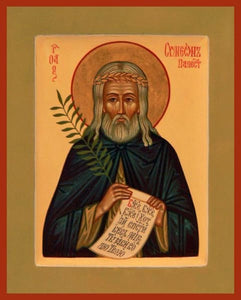The Fools for Christ: Embracing Divine Madness for Spiritual Clarity

Today, as we celebrate the feast of St. Simeon the Fool for Christ, we reflect upon the enigmatic and profound tradition of the “Fools for Christ” within the Orthodox Church. These extraordinary saints, often misunderstood and sometimes ridiculed, embraced a unique and radical path to divine wisdom and holiness.
Who Were the Fools for Christ?
The “Fools for Christ,” also known as “Yurodivy” in Russian, were individuals who chose to take on a guise of madness or eccentricity to deliver spiritual truths and critique the societal and religious norms of their time. Their apparent folly was a mask, concealing deep spiritual insight and a profound commitment to living out the Gospel in its most radical form.
Among the most renowned Fools for Christ are St. Simeon of Emesa, celebrated today, St. Basil the Blessed of Moscow, and St. Xenia of St. Petersburg. These saints, though appearing irrational or even mad to their contemporaries, were revered for their intense piety, asceticism, and often miraculous abilities.
St. Symeon the Fool for Christ
St. Symeon of Emesa, who lived in the 6th century, is one of the earliest and most illustrious examples of this tradition. A monk who initially lived a life of severe asceticism in the desert, Simeon later felt called to a more unconventional path. Returning to the city of Emesa, he adopted the guise of a madman, engaging in bizarre and provocative behavior to conceal his spiritual gifts and avoid the praise of men.
St. Symeon’s apparent madness allowed him to challenge the hypocrisy, greed, and lack of compassion he saw around him. He was known to perform surprising acts of charity and kindness in secret, revealing his true nature only to those with eyes to see. Through his actions, he led many to repentance and a deeper understanding of the Christian faith.
The Mission of the Fools for Christ
The mission of the Fools for Christ was multifaceted:
Humility and Hiddenness: By adopting a persona of foolishness, these saints avoided the temptations of pride and worldly recognition. Their hidden lives allowed them to cultivate humility and maintain focus on their spiritual goals.
Prophetic Critique: Their actions often served as a living critique of the moral and spiritual failings of their society. Through their apparent madness, they exposed hypocrisy, greed, and corruption, calling people to genuine repentance and faith. This (and not predicting the future necessarily) is the work of a prophet.
Subversive Wisdom: The Fools for Christ embodied a divine wisdom that subverted worldly expectations. Their behavior, while seemingly irrational, pointed to deeper spiritual truths and the radical nature of the Gospel.
Radical Love: Their seemingly nonsensical actions often masked acts of profound love and charity. By living on the margins of society, they identified with the poor and marginalized, demonstrating the inclusive and boundary-breaking love of Christ.
The Legacy of the Fools for Christ
The legacy of the Fools for Christ endures as a powerful testament to the transformative power of divine madness. In a world that often values rationality, conformity, and social status, their lives remind us of the countercultural and radical nature of the Christian faith. They call us to look beyond appearances and to seek the deeper spiritual truths that lie beneath the surface of our everyday lives.
As we honor St. Symeon the Fool for Christ today, let us remember the profound lessons he and other Fools for Christ offer us. May their example inspire us to embrace humility, challenge injustice, and live out our faith with a radical and selfless love.
In their seeming madness, the Fools for Christ reveal the ultimate wisdom of God—a wisdom that confounds the wise and calls us to a deeper, more authentic relationship with the Divine.





